MGT701: Perceptual Errors, Attributions, and Biases in Decisions
VerifiedAdded on 2023/06/12
|8
|2907
|190
Essay
AI Summary
This essay discusses the critical role of perceptual errors, attributions, and biases in managerial decision-making processes. It highlights how perceptual errors such as stereotyping, halo effect, and recency effect can lead to unreliable and inconsistent decisions, potentially undermining organizational efficiency and employee morale. The essay also examines the influence of attributions, emphasizing the importance of leadership qualities and experience in fostering better decision-making and HR management practices. Furthermore, it addresses the negative impact of biases on ethical considerations, risk management, and safety protocols within an organization. The recommendations and conclusions emphasize the importance of strengthening information systems, promoting knowledge enhancement, and ensuring diverse perspectives in decision-making to mitigate the adverse effects of these factors and enhance organizational performance.
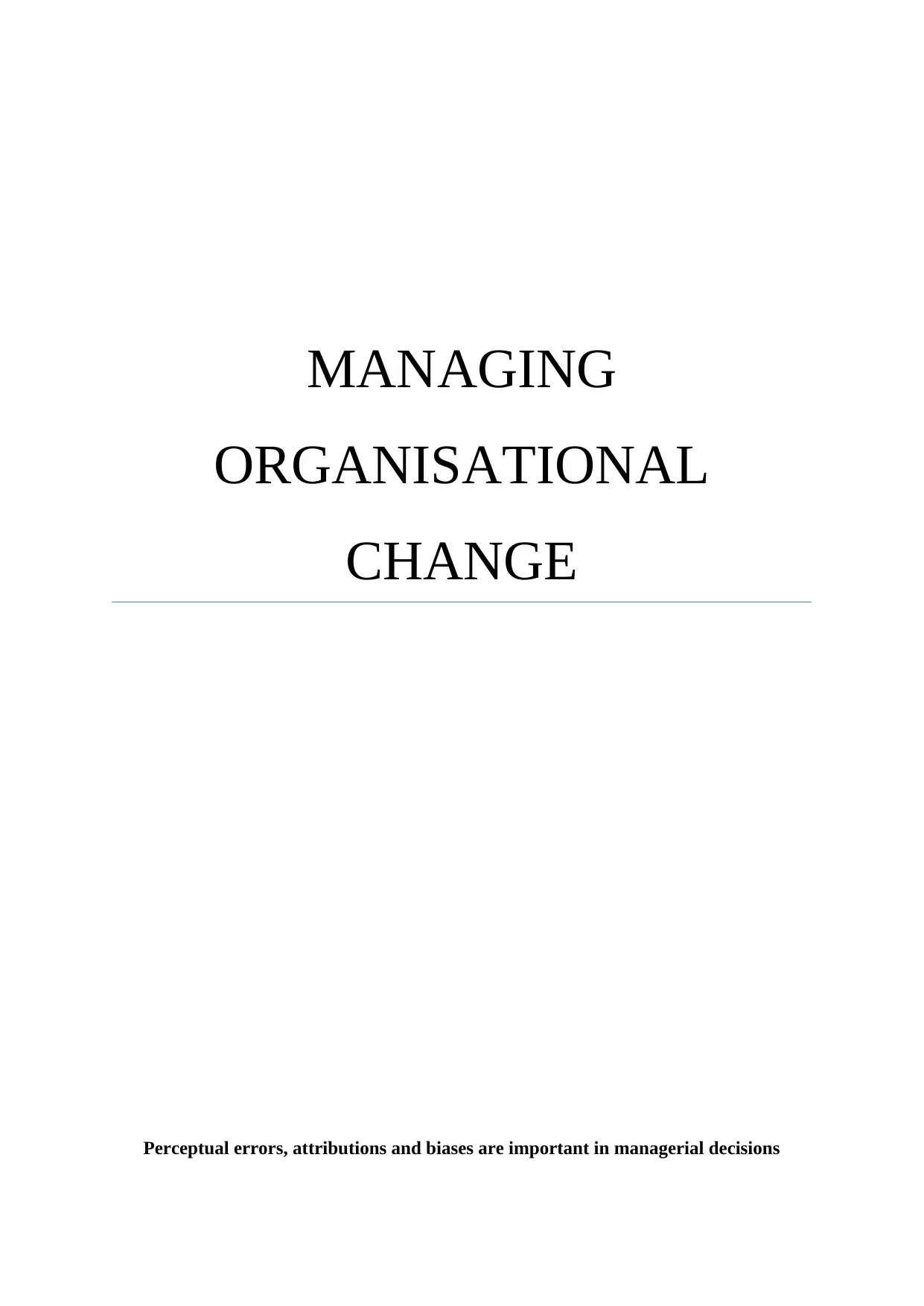
MANAGING
ORGANISATIONAL
CHANGE
Perceptual errors, attributions and biases are important in managerial decisions
ORGANISATIONAL
CHANGE
Perceptual errors, attributions and biases are important in managerial decisions
Paraphrase This Document
Need a fresh take? Get an instant paraphrase of this document with our AI Paraphraser
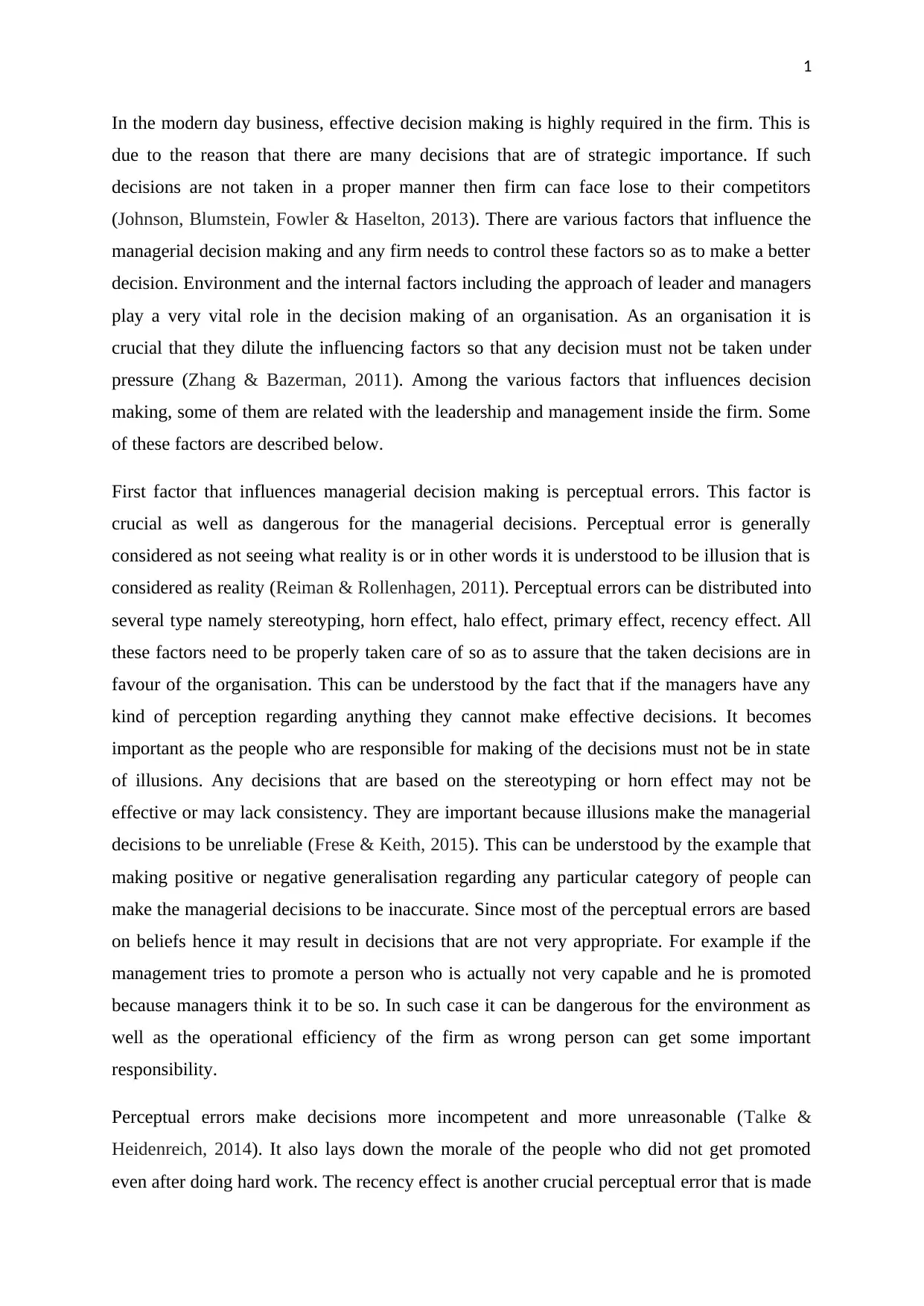
1
In the modern day business, effective decision making is highly required in the firm. This is
due to the reason that there are many decisions that are of strategic importance. If such
decisions are not taken in a proper manner then firm can face lose to their competitors
(Johnson, Blumstein, Fowler & Haselton, 2013). There are various factors that influence the
managerial decision making and any firm needs to control these factors so as to make a better
decision. Environment and the internal factors including the approach of leader and managers
play a very vital role in the decision making of an organisation. As an organisation it is
crucial that they dilute the influencing factors so that any decision must not be taken under
pressure (Zhang & Bazerman, 2011). Among the various factors that influences decision
making, some of them are related with the leadership and management inside the firm. Some
of these factors are described below.
First factor that influences managerial decision making is perceptual errors. This factor is
crucial as well as dangerous for the managerial decisions. Perceptual error is generally
considered as not seeing what reality is or in other words it is understood to be illusion that is
considered as reality (Reiman & Rollenhagen, 2011). Perceptual errors can be distributed into
several type namely stereotyping, horn effect, halo effect, primary effect, recency effect. All
these factors need to be properly taken care of so as to assure that the taken decisions are in
favour of the organisation. This can be understood by the fact that if the managers have any
kind of perception regarding anything they cannot make effective decisions. It becomes
important as the people who are responsible for making of the decisions must not be in state
of illusions. Any decisions that are based on the stereotyping or horn effect may not be
effective or may lack consistency. They are important because illusions make the managerial
decisions to be unreliable (Frese & Keith, 2015). This can be understood by the example that
making positive or negative generalisation regarding any particular category of people can
make the managerial decisions to be inaccurate. Since most of the perceptual errors are based
on beliefs hence it may result in decisions that are not very appropriate. For example if the
management tries to promote a person who is actually not very capable and he is promoted
because managers think it to be so. In such case it can be dangerous for the environment as
well as the operational efficiency of the firm as wrong person can get some important
responsibility.
Perceptual errors make decisions more incompetent and more unreasonable (Talke &
Heidenreich, 2014). It also lays down the morale of the people who did not get promoted
even after doing hard work. The recency effect is another crucial perceptual error that is made
In the modern day business, effective decision making is highly required in the firm. This is
due to the reason that there are many decisions that are of strategic importance. If such
decisions are not taken in a proper manner then firm can face lose to their competitors
(Johnson, Blumstein, Fowler & Haselton, 2013). There are various factors that influence the
managerial decision making and any firm needs to control these factors so as to make a better
decision. Environment and the internal factors including the approach of leader and managers
play a very vital role in the decision making of an organisation. As an organisation it is
crucial that they dilute the influencing factors so that any decision must not be taken under
pressure (Zhang & Bazerman, 2011). Among the various factors that influences decision
making, some of them are related with the leadership and management inside the firm. Some
of these factors are described below.
First factor that influences managerial decision making is perceptual errors. This factor is
crucial as well as dangerous for the managerial decisions. Perceptual error is generally
considered as not seeing what reality is or in other words it is understood to be illusion that is
considered as reality (Reiman & Rollenhagen, 2011). Perceptual errors can be distributed into
several type namely stereotyping, horn effect, halo effect, primary effect, recency effect. All
these factors need to be properly taken care of so as to assure that the taken decisions are in
favour of the organisation. This can be understood by the fact that if the managers have any
kind of perception regarding anything they cannot make effective decisions. It becomes
important as the people who are responsible for making of the decisions must not be in state
of illusions. Any decisions that are based on the stereotyping or horn effect may not be
effective or may lack consistency. They are important because illusions make the managerial
decisions to be unreliable (Frese & Keith, 2015). This can be understood by the example that
making positive or negative generalisation regarding any particular category of people can
make the managerial decisions to be inaccurate. Since most of the perceptual errors are based
on beliefs hence it may result in decisions that are not very appropriate. For example if the
management tries to promote a person who is actually not very capable and he is promoted
because managers think it to be so. In such case it can be dangerous for the environment as
well as the operational efficiency of the firm as wrong person can get some important
responsibility.
Perceptual errors make decisions more incompetent and more unreasonable (Talke &
Heidenreich, 2014). It also lays down the morale of the people who did not get promoted
even after doing hard work. The recency effect is another crucial perceptual error that is made
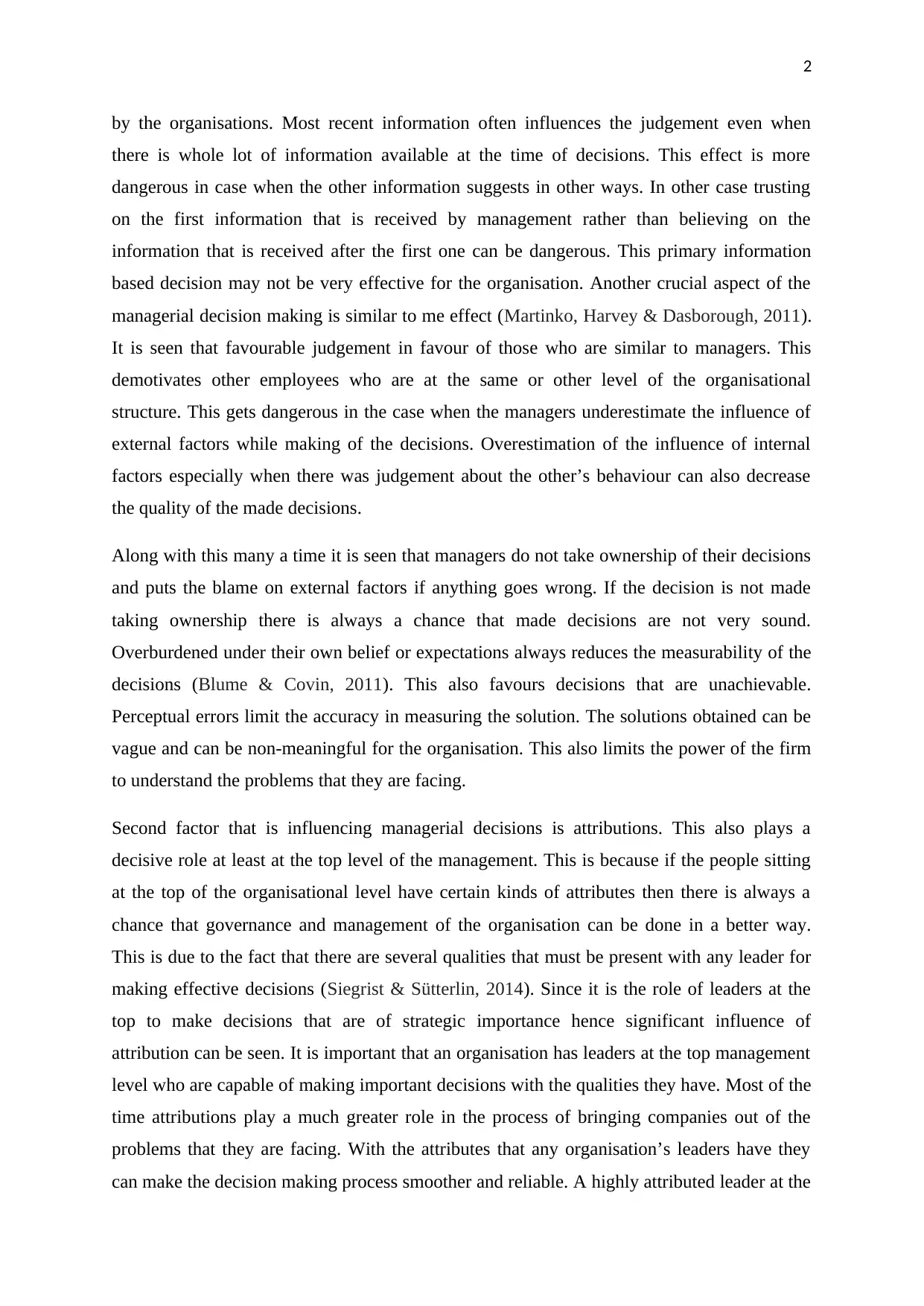
2
by the organisations. Most recent information often influences the judgement even when
there is whole lot of information available at the time of decisions. This effect is more
dangerous in case when the other information suggests in other ways. In other case trusting
on the first information that is received by management rather than believing on the
information that is received after the first one can be dangerous. This primary information
based decision may not be very effective for the organisation. Another crucial aspect of the
managerial decision making is similar to me effect (Martinko, Harvey & Dasborough, 2011).
It is seen that favourable judgement in favour of those who are similar to managers. This
demotivates other employees who are at the same or other level of the organisational
structure. This gets dangerous in the case when the managers underestimate the influence of
external factors while making of the decisions. Overestimation of the influence of internal
factors especially when there was judgement about the other’s behaviour can also decrease
the quality of the made decisions.
Along with this many a time it is seen that managers do not take ownership of their decisions
and puts the blame on external factors if anything goes wrong. If the decision is not made
taking ownership there is always a chance that made decisions are not very sound.
Overburdened under their own belief or expectations always reduces the measurability of the
decisions (Blume & Covin, 2011). This also favours decisions that are unachievable.
Perceptual errors limit the accuracy in measuring the solution. The solutions obtained can be
vague and can be non-meaningful for the organisation. This also limits the power of the firm
to understand the problems that they are facing.
Second factor that is influencing managerial decisions is attributions. This also plays a
decisive role at least at the top level of the management. This is because if the people sitting
at the top of the organisational level have certain kinds of attributes then there is always a
chance that governance and management of the organisation can be done in a better way.
This is due to the fact that there are several qualities that must be present with any leader for
making effective decisions (Siegrist & Sütterlin, 2014). Since it is the role of leaders at the
top to make decisions that are of strategic importance hence significant influence of
attribution can be seen. It is important that an organisation has leaders at the top management
level who are capable of making important decisions with the qualities they have. Most of the
time attributions play a much greater role in the process of bringing companies out of the
problems that they are facing. With the attributes that any organisation’s leaders have they
can make the decision making process smoother and reliable. A highly attributed leader at the
by the organisations. Most recent information often influences the judgement even when
there is whole lot of information available at the time of decisions. This effect is more
dangerous in case when the other information suggests in other ways. In other case trusting
on the first information that is received by management rather than believing on the
information that is received after the first one can be dangerous. This primary information
based decision may not be very effective for the organisation. Another crucial aspect of the
managerial decision making is similar to me effect (Martinko, Harvey & Dasborough, 2011).
It is seen that favourable judgement in favour of those who are similar to managers. This
demotivates other employees who are at the same or other level of the organisational
structure. This gets dangerous in the case when the managers underestimate the influence of
external factors while making of the decisions. Overestimation of the influence of internal
factors especially when there was judgement about the other’s behaviour can also decrease
the quality of the made decisions.
Along with this many a time it is seen that managers do not take ownership of their decisions
and puts the blame on external factors if anything goes wrong. If the decision is not made
taking ownership there is always a chance that made decisions are not very sound.
Overburdened under their own belief or expectations always reduces the measurability of the
decisions (Blume & Covin, 2011). This also favours decisions that are unachievable.
Perceptual errors limit the accuracy in measuring the solution. The solutions obtained can be
vague and can be non-meaningful for the organisation. This also limits the power of the firm
to understand the problems that they are facing.
Second factor that is influencing managerial decisions is attributions. This also plays a
decisive role at least at the top level of the management. This is because if the people sitting
at the top of the organisational level have certain kinds of attributes then there is always a
chance that governance and management of the organisation can be done in a better way.
This is due to the fact that there are several qualities that must be present with any leader for
making effective decisions (Siegrist & Sütterlin, 2014). Since it is the role of leaders at the
top to make decisions that are of strategic importance hence significant influence of
attribution can be seen. It is important that an organisation has leaders at the top management
level who are capable of making important decisions with the qualities they have. Most of the
time attributions play a much greater role in the process of bringing companies out of the
problems that they are facing. With the attributes that any organisation’s leaders have they
can make the decision making process smoother and reliable. A highly attributed leader at the
⊘ This is a preview!⊘
Do you want full access?
Subscribe today to unlock all pages.

Trusted by 1+ million students worldwide
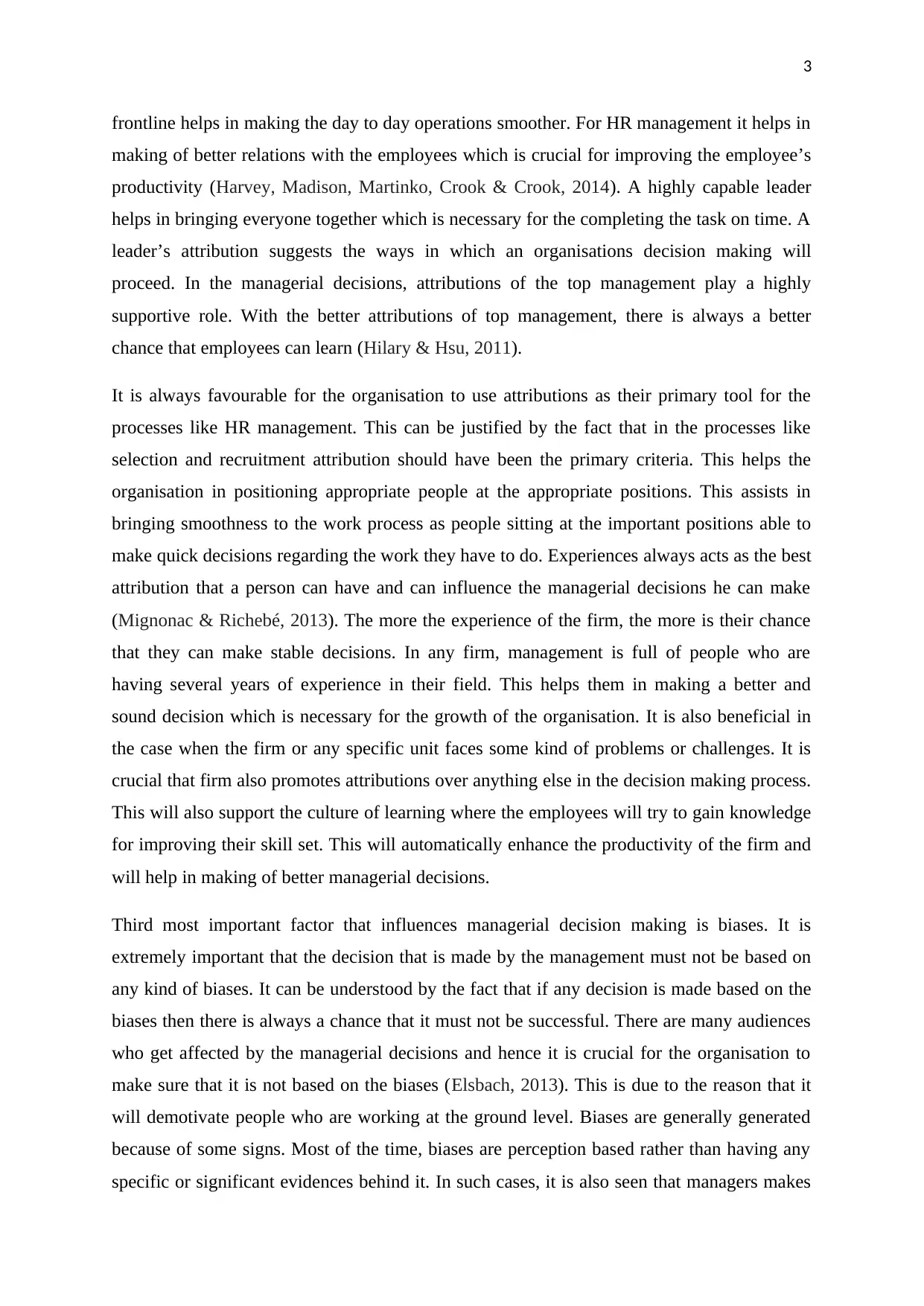
3
frontline helps in making the day to day operations smoother. For HR management it helps in
making of better relations with the employees which is crucial for improving the employee’s
productivity (Harvey, Madison, Martinko, Crook & Crook, 2014). A highly capable leader
helps in bringing everyone together which is necessary for the completing the task on time. A
leader’s attribution suggests the ways in which an organisations decision making will
proceed. In the managerial decisions, attributions of the top management play a highly
supportive role. With the better attributions of top management, there is always a better
chance that employees can learn (Hilary & Hsu, 2011).
It is always favourable for the organisation to use attributions as their primary tool for the
processes like HR management. This can be justified by the fact that in the processes like
selection and recruitment attribution should have been the primary criteria. This helps the
organisation in positioning appropriate people at the appropriate positions. This assists in
bringing smoothness to the work process as people sitting at the important positions able to
make quick decisions regarding the work they have to do. Experiences always acts as the best
attribution that a person can have and can influence the managerial decisions he can make
(Mignonac & Richebé, 2013). The more the experience of the firm, the more is their chance
that they can make stable decisions. In any firm, management is full of people who are
having several years of experience in their field. This helps them in making a better and
sound decision which is necessary for the growth of the organisation. It is also beneficial in
the case when the firm or any specific unit faces some kind of problems or challenges. It is
crucial that firm also promotes attributions over anything else in the decision making process.
This will also support the culture of learning where the employees will try to gain knowledge
for improving their skill set. This will automatically enhance the productivity of the firm and
will help in making of better managerial decisions.
Third most important factor that influences managerial decision making is biases. It is
extremely important that the decision that is made by the management must not be based on
any kind of biases. It can be understood by the fact that if any decision is made based on the
biases then there is always a chance that it must not be successful. There are many audiences
who get affected by the managerial decisions and hence it is crucial for the organisation to
make sure that it is not based on the biases (Elsbach, 2013). This is due to the reason that it
will demotivate people who are working at the ground level. Biases are generally generated
because of some signs. Most of the time, biases are perception based rather than having any
specific or significant evidences behind it. In such cases, it is also seen that managers makes
frontline helps in making the day to day operations smoother. For HR management it helps in
making of better relations with the employees which is crucial for improving the employee’s
productivity (Harvey, Madison, Martinko, Crook & Crook, 2014). A highly capable leader
helps in bringing everyone together which is necessary for the completing the task on time. A
leader’s attribution suggests the ways in which an organisations decision making will
proceed. In the managerial decisions, attributions of the top management play a highly
supportive role. With the better attributions of top management, there is always a better
chance that employees can learn (Hilary & Hsu, 2011).
It is always favourable for the organisation to use attributions as their primary tool for the
processes like HR management. This can be justified by the fact that in the processes like
selection and recruitment attribution should have been the primary criteria. This helps the
organisation in positioning appropriate people at the appropriate positions. This assists in
bringing smoothness to the work process as people sitting at the important positions able to
make quick decisions regarding the work they have to do. Experiences always acts as the best
attribution that a person can have and can influence the managerial decisions he can make
(Mignonac & Richebé, 2013). The more the experience of the firm, the more is their chance
that they can make stable decisions. In any firm, management is full of people who are
having several years of experience in their field. This helps them in making a better and
sound decision which is necessary for the growth of the organisation. It is also beneficial in
the case when the firm or any specific unit faces some kind of problems or challenges. It is
crucial that firm also promotes attributions over anything else in the decision making process.
This will also support the culture of learning where the employees will try to gain knowledge
for improving their skill set. This will automatically enhance the productivity of the firm and
will help in making of better managerial decisions.
Third most important factor that influences managerial decision making is biases. It is
extremely important that the decision that is made by the management must not be based on
any kind of biases. It can be understood by the fact that if any decision is made based on the
biases then there is always a chance that it must not be successful. There are many audiences
who get affected by the managerial decisions and hence it is crucial for the organisation to
make sure that it is not based on the biases (Elsbach, 2013). This is due to the reason that it
will demotivate people who are working at the ground level. Biases are generally generated
because of some signs. Most of the time, biases are perception based rather than having any
specific or significant evidences behind it. In such cases, it is also seen that managers makes
Paraphrase This Document
Need a fresh take? Get an instant paraphrase of this document with our AI Paraphraser
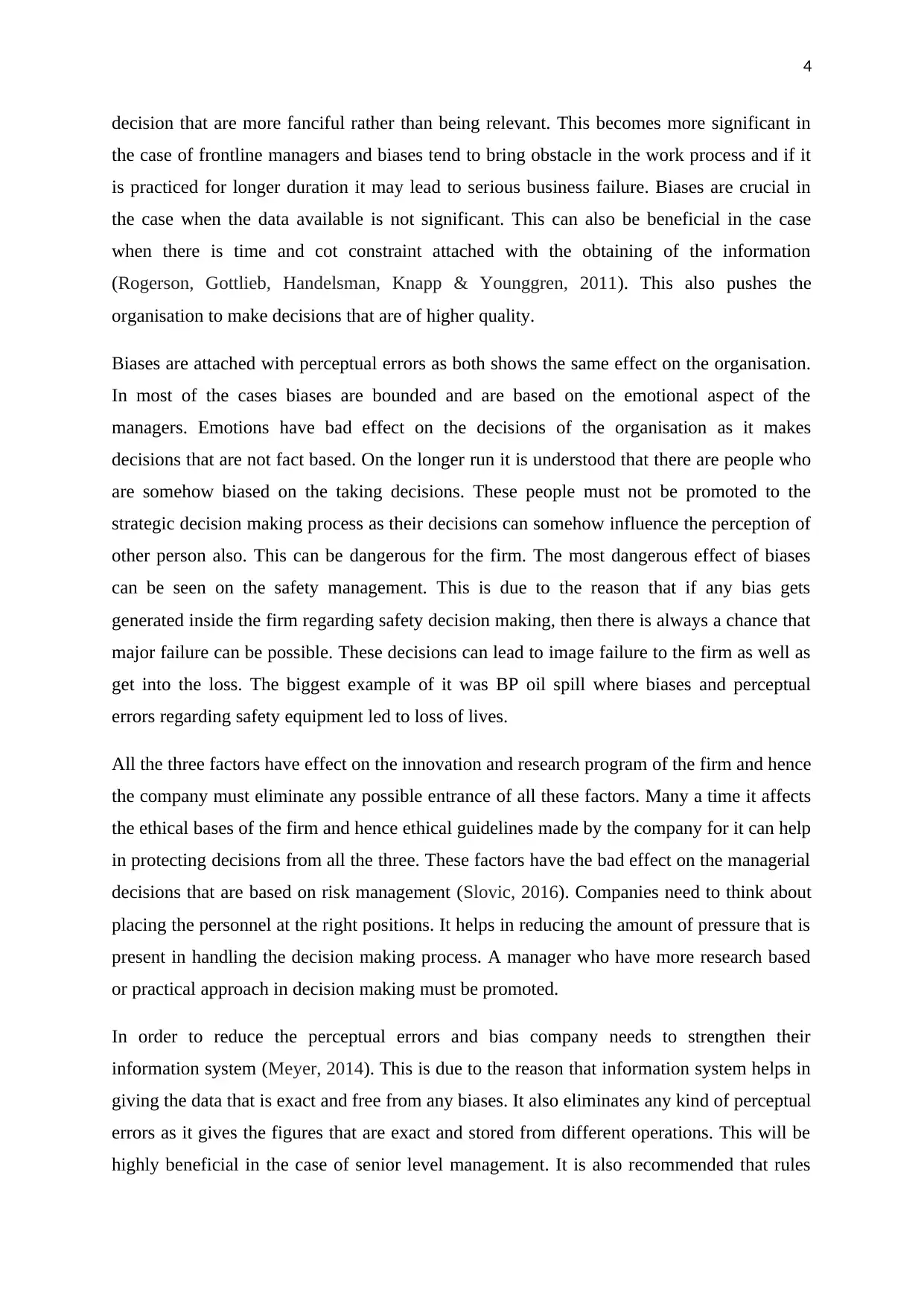
4
decision that are more fanciful rather than being relevant. This becomes more significant in
the case of frontline managers and biases tend to bring obstacle in the work process and if it
is practiced for longer duration it may lead to serious business failure. Biases are crucial in
the case when the data available is not significant. This can also be beneficial in the case
when there is time and cot constraint attached with the obtaining of the information
(Rogerson, Gottlieb, Handelsman, Knapp & Younggren, 2011). This also pushes the
organisation to make decisions that are of higher quality.
Biases are attached with perceptual errors as both shows the same effect on the organisation.
In most of the cases biases are bounded and are based on the emotional aspect of the
managers. Emotions have bad effect on the decisions of the organisation as it makes
decisions that are not fact based. On the longer run it is understood that there are people who
are somehow biased on the taking decisions. These people must not be promoted to the
strategic decision making process as their decisions can somehow influence the perception of
other person also. This can be dangerous for the firm. The most dangerous effect of biases
can be seen on the safety management. This is due to the reason that if any bias gets
generated inside the firm regarding safety decision making, then there is always a chance that
major failure can be possible. These decisions can lead to image failure to the firm as well as
get into the loss. The biggest example of it was BP oil spill where biases and perceptual
errors regarding safety equipment led to loss of lives.
All the three factors have effect on the innovation and research program of the firm and hence
the company must eliminate any possible entrance of all these factors. Many a time it affects
the ethical bases of the firm and hence ethical guidelines made by the company for it can help
in protecting decisions from all the three. These factors have the bad effect on the managerial
decisions that are based on risk management (Slovic, 2016). Companies need to think about
placing the personnel at the right positions. It helps in reducing the amount of pressure that is
present in handling the decision making process. A manager who have more research based
or practical approach in decision making must be promoted.
In order to reduce the perceptual errors and bias company needs to strengthen their
information system (Meyer, 2014). This is due to the reason that information system helps in
giving the data that is exact and free from any biases. It also eliminates any kind of perceptual
errors as it gives the figures that are exact and stored from different operations. This will be
highly beneficial in the case of senior level management. It is also recommended that rules
decision that are more fanciful rather than being relevant. This becomes more significant in
the case of frontline managers and biases tend to bring obstacle in the work process and if it
is practiced for longer duration it may lead to serious business failure. Biases are crucial in
the case when the data available is not significant. This can also be beneficial in the case
when there is time and cot constraint attached with the obtaining of the information
(Rogerson, Gottlieb, Handelsman, Knapp & Younggren, 2011). This also pushes the
organisation to make decisions that are of higher quality.
Biases are attached with perceptual errors as both shows the same effect on the organisation.
In most of the cases biases are bounded and are based on the emotional aspect of the
managers. Emotions have bad effect on the decisions of the organisation as it makes
decisions that are not fact based. On the longer run it is understood that there are people who
are somehow biased on the taking decisions. These people must not be promoted to the
strategic decision making process as their decisions can somehow influence the perception of
other person also. This can be dangerous for the firm. The most dangerous effect of biases
can be seen on the safety management. This is due to the reason that if any bias gets
generated inside the firm regarding safety decision making, then there is always a chance that
major failure can be possible. These decisions can lead to image failure to the firm as well as
get into the loss. The biggest example of it was BP oil spill where biases and perceptual
errors regarding safety equipment led to loss of lives.
All the three factors have effect on the innovation and research program of the firm and hence
the company must eliminate any possible entrance of all these factors. Many a time it affects
the ethical bases of the firm and hence ethical guidelines made by the company for it can help
in protecting decisions from all the three. These factors have the bad effect on the managerial
decisions that are based on risk management (Slovic, 2016). Companies need to think about
placing the personnel at the right positions. It helps in reducing the amount of pressure that is
present in handling the decision making process. A manager who have more research based
or practical approach in decision making must be promoted.
In order to reduce the perceptual errors and bias company needs to strengthen their
information system (Meyer, 2014). This is due to the reason that information system helps in
giving the data that is exact and free from any biases. It also eliminates any kind of perceptual
errors as it gives the figures that are exact and stored from different operations. This will be
highly beneficial in the case of senior level management. It is also recommended that rules
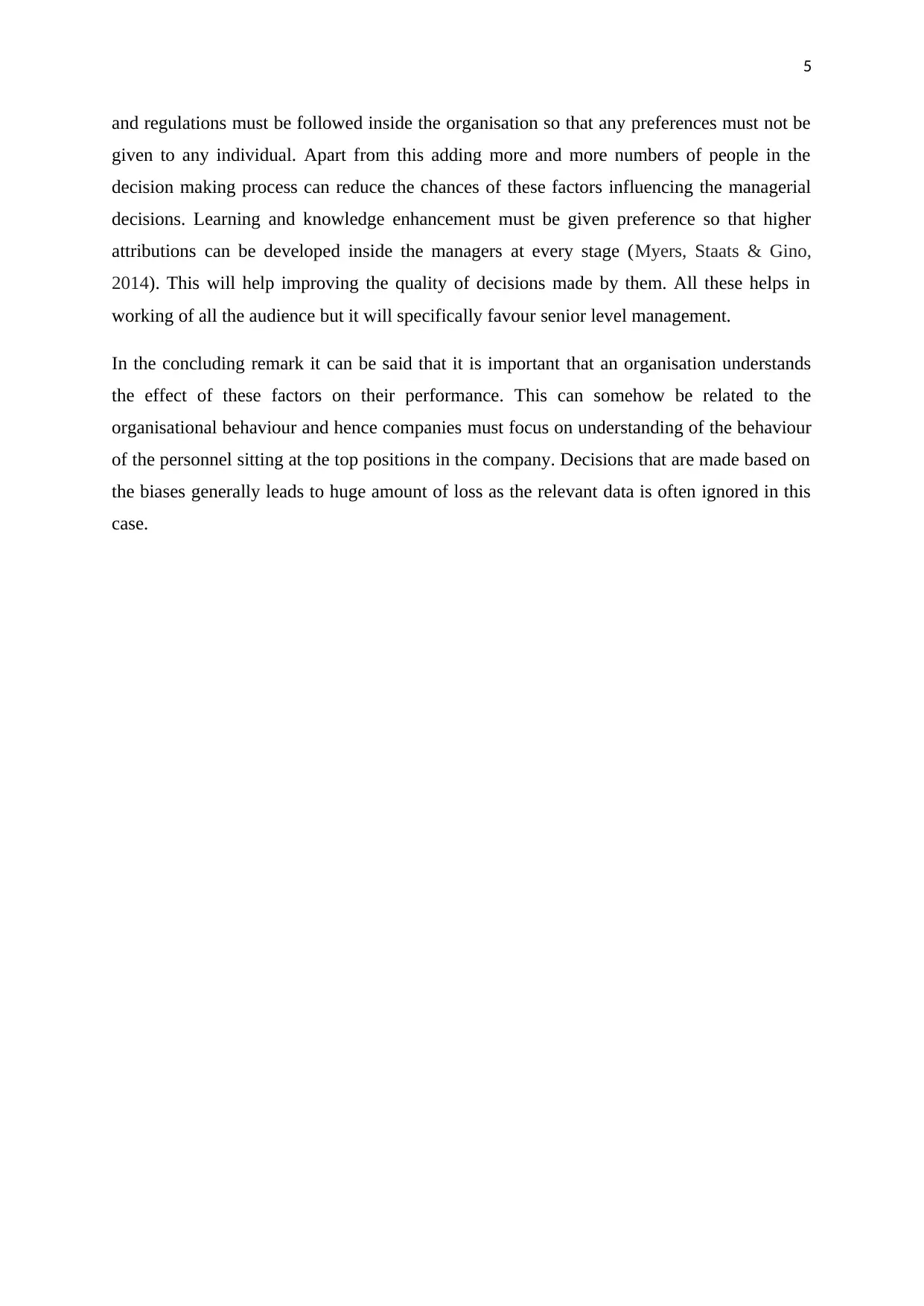
5
and regulations must be followed inside the organisation so that any preferences must not be
given to any individual. Apart from this adding more and more numbers of people in the
decision making process can reduce the chances of these factors influencing the managerial
decisions. Learning and knowledge enhancement must be given preference so that higher
attributions can be developed inside the managers at every stage (Myers, Staats & Gino,
2014). This will help improving the quality of decisions made by them. All these helps in
working of all the audience but it will specifically favour senior level management.
In the concluding remark it can be said that it is important that an organisation understands
the effect of these factors on their performance. This can somehow be related to the
organisational behaviour and hence companies must focus on understanding of the behaviour
of the personnel sitting at the top positions in the company. Decisions that are made based on
the biases generally leads to huge amount of loss as the relevant data is often ignored in this
case.
and regulations must be followed inside the organisation so that any preferences must not be
given to any individual. Apart from this adding more and more numbers of people in the
decision making process can reduce the chances of these factors influencing the managerial
decisions. Learning and knowledge enhancement must be given preference so that higher
attributions can be developed inside the managers at every stage (Myers, Staats & Gino,
2014). This will help improving the quality of decisions made by them. All these helps in
working of all the audience but it will specifically favour senior level management.
In the concluding remark it can be said that it is important that an organisation understands
the effect of these factors on their performance. This can somehow be related to the
organisational behaviour and hence companies must focus on understanding of the behaviour
of the personnel sitting at the top positions in the company. Decisions that are made based on
the biases generally leads to huge amount of loss as the relevant data is often ignored in this
case.
⊘ This is a preview!⊘
Do you want full access?
Subscribe today to unlock all pages.

Trusted by 1+ million students worldwide
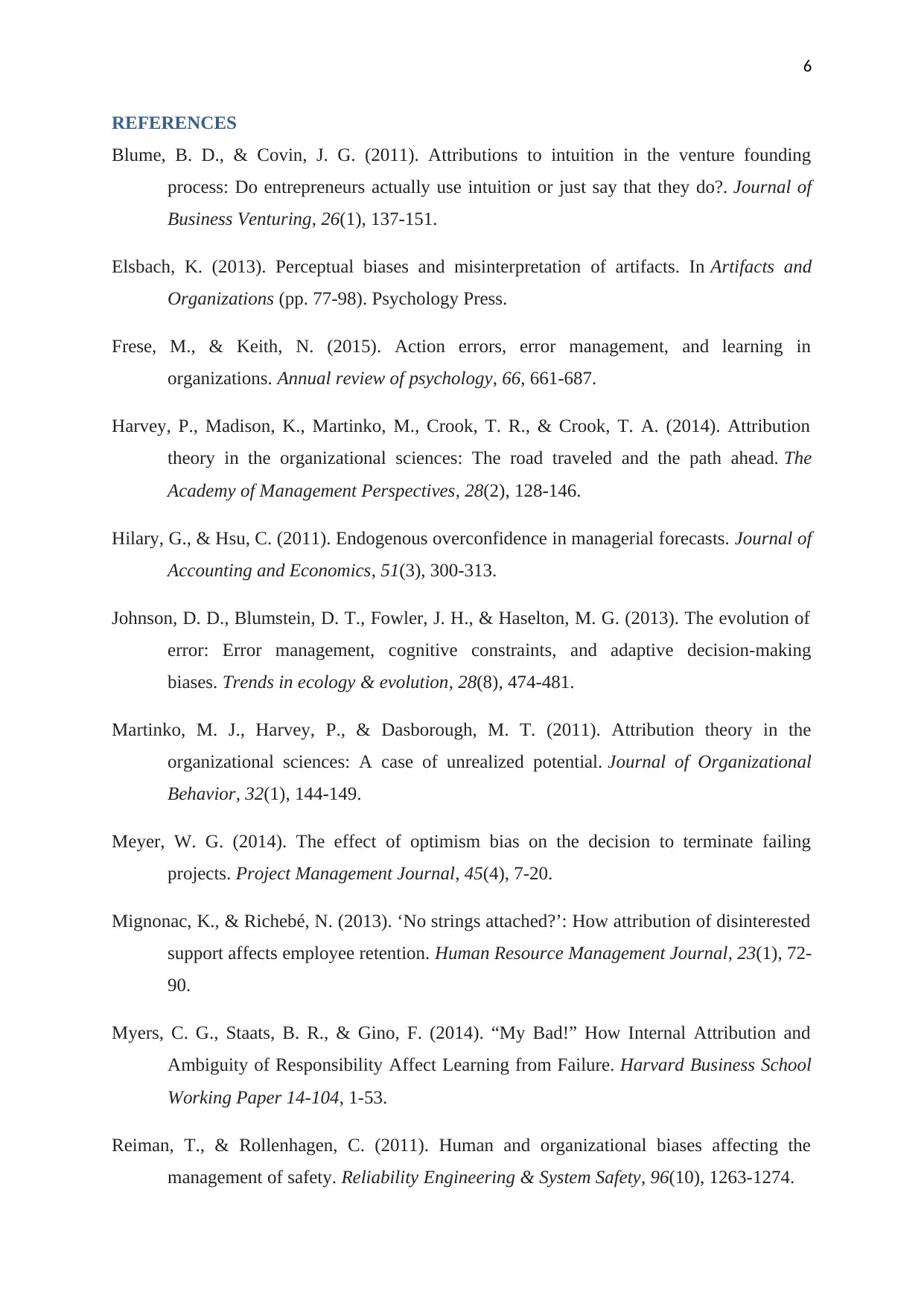
6
REFERENCES
Blume, B. D., & Covin, J. G. (2011). Attributions to intuition in the venture founding
process: Do entrepreneurs actually use intuition or just say that they do?. Journal of
Business Venturing, 26(1), 137-151.
Elsbach, K. (2013). Perceptual biases and misinterpretation of artifacts. In Artifacts and
Organizations (pp. 77-98). Psychology Press.
Frese, M., & Keith, N. (2015). Action errors, error management, and learning in
organizations. Annual review of psychology, 66, 661-687.
Harvey, P., Madison, K., Martinko, M., Crook, T. R., & Crook, T. A. (2014). Attribution
theory in the organizational sciences: The road traveled and the path ahead. The
Academy of Management Perspectives, 28(2), 128-146.
Hilary, G., & Hsu, C. (2011). Endogenous overconfidence in managerial forecasts. Journal of
Accounting and Economics, 51(3), 300-313.
Johnson, D. D., Blumstein, D. T., Fowler, J. H., & Haselton, M. G. (2013). The evolution of
error: Error management, cognitive constraints, and adaptive decision-making
biases. Trends in ecology & evolution, 28(8), 474-481.
Martinko, M. J., Harvey, P., & Dasborough, M. T. (2011). Attribution theory in the
organizational sciences: A case of unrealized potential. Journal of Organizational
Behavior, 32(1), 144-149.
Meyer, W. G. (2014). The effect of optimism bias on the decision to terminate failing
projects. Project Management Journal, 45(4), 7-20.
Mignonac, K., & Richebé, N. (2013). ‘No strings attached?’: How attribution of disinterested
support affects employee retention. Human Resource Management Journal, 23(1), 72-
90.
Myers, C. G., Staats, B. R., & Gino, F. (2014). “My Bad!” How Internal Attribution and
Ambiguity of Responsibility Affect Learning from Failure. Harvard Business School
Working Paper 14-104, 1-53.
Reiman, T., & Rollenhagen, C. (2011). Human and organizational biases affecting the
management of safety. Reliability Engineering & System Safety, 96(10), 1263-1274.
REFERENCES
Blume, B. D., & Covin, J. G. (2011). Attributions to intuition in the venture founding
process: Do entrepreneurs actually use intuition or just say that they do?. Journal of
Business Venturing, 26(1), 137-151.
Elsbach, K. (2013). Perceptual biases and misinterpretation of artifacts. In Artifacts and
Organizations (pp. 77-98). Psychology Press.
Frese, M., & Keith, N. (2015). Action errors, error management, and learning in
organizations. Annual review of psychology, 66, 661-687.
Harvey, P., Madison, K., Martinko, M., Crook, T. R., & Crook, T. A. (2014). Attribution
theory in the organizational sciences: The road traveled and the path ahead. The
Academy of Management Perspectives, 28(2), 128-146.
Hilary, G., & Hsu, C. (2011). Endogenous overconfidence in managerial forecasts. Journal of
Accounting and Economics, 51(3), 300-313.
Johnson, D. D., Blumstein, D. T., Fowler, J. H., & Haselton, M. G. (2013). The evolution of
error: Error management, cognitive constraints, and adaptive decision-making
biases. Trends in ecology & evolution, 28(8), 474-481.
Martinko, M. J., Harvey, P., & Dasborough, M. T. (2011). Attribution theory in the
organizational sciences: A case of unrealized potential. Journal of Organizational
Behavior, 32(1), 144-149.
Meyer, W. G. (2014). The effect of optimism bias on the decision to terminate failing
projects. Project Management Journal, 45(4), 7-20.
Mignonac, K., & Richebé, N. (2013). ‘No strings attached?’: How attribution of disinterested
support affects employee retention. Human Resource Management Journal, 23(1), 72-
90.
Myers, C. G., Staats, B. R., & Gino, F. (2014). “My Bad!” How Internal Attribution and
Ambiguity of Responsibility Affect Learning from Failure. Harvard Business School
Working Paper 14-104, 1-53.
Reiman, T., & Rollenhagen, C. (2011). Human and organizational biases affecting the
management of safety. Reliability Engineering & System Safety, 96(10), 1263-1274.
Paraphrase This Document
Need a fresh take? Get an instant paraphrase of this document with our AI Paraphraser
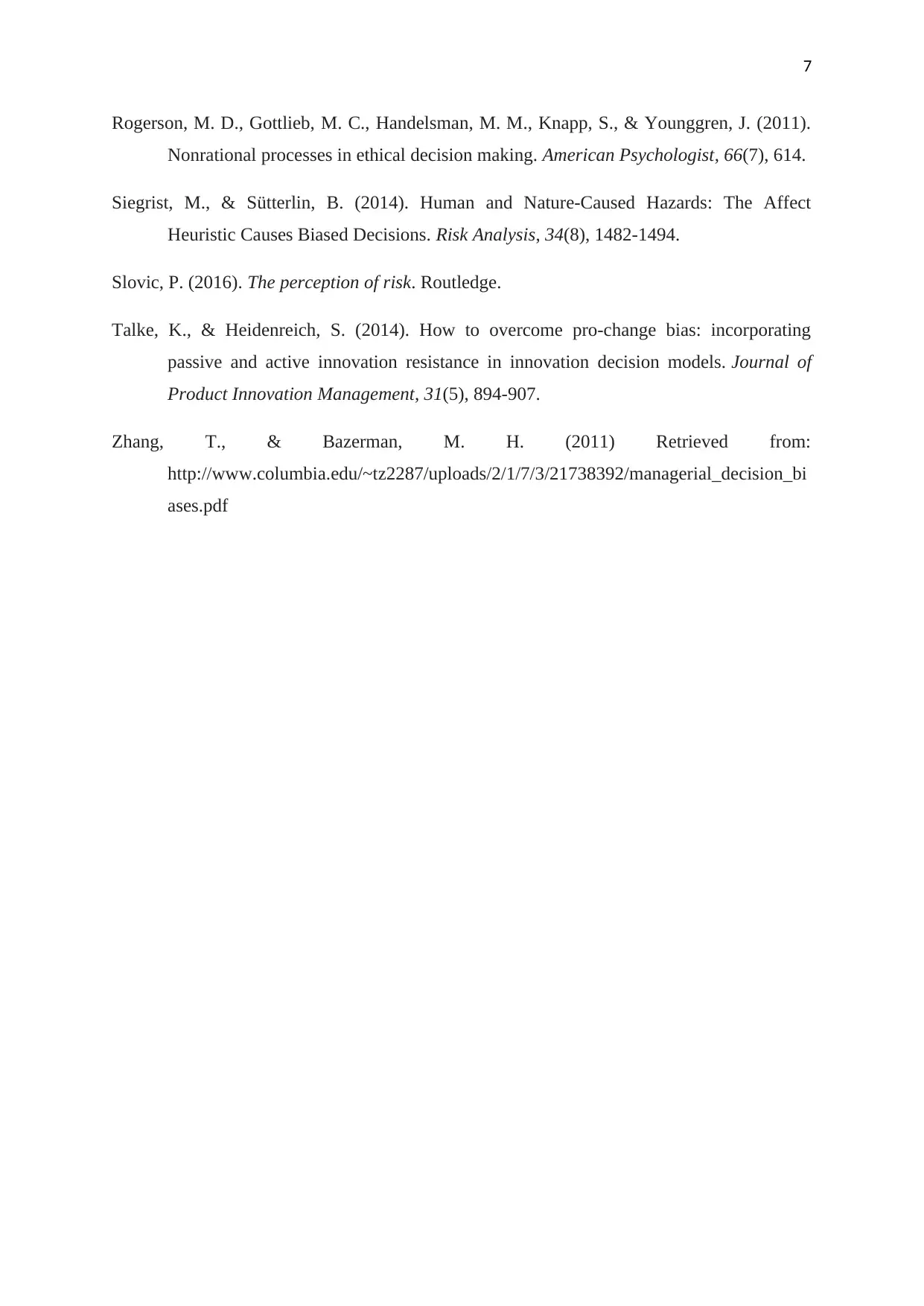
7
Rogerson, M. D., Gottlieb, M. C., Handelsman, M. M., Knapp, S., & Younggren, J. (2011).
Nonrational processes in ethical decision making. American Psychologist, 66(7), 614.
Siegrist, M., & Sütterlin, B. (2014). Human and Nature‐Caused Hazards: The Affect
Heuristic Causes Biased Decisions. Risk Analysis, 34(8), 1482-1494.
Slovic, P. (2016). The perception of risk. Routledge.
Talke, K., & Heidenreich, S. (2014). How to overcome pro‐change bias: incorporating
passive and active innovation resistance in innovation decision models. Journal of
Product Innovation Management, 31(5), 894-907.
Zhang, T., & Bazerman, M. H. (2011) Retrieved from:
http://www.columbia.edu/~tz2287/uploads/2/1/7/3/21738392/managerial_decision_bi
ases.pdf
Rogerson, M. D., Gottlieb, M. C., Handelsman, M. M., Knapp, S., & Younggren, J. (2011).
Nonrational processes in ethical decision making. American Psychologist, 66(7), 614.
Siegrist, M., & Sütterlin, B. (2014). Human and Nature‐Caused Hazards: The Affect
Heuristic Causes Biased Decisions. Risk Analysis, 34(8), 1482-1494.
Slovic, P. (2016). The perception of risk. Routledge.
Talke, K., & Heidenreich, S. (2014). How to overcome pro‐change bias: incorporating
passive and active innovation resistance in innovation decision models. Journal of
Product Innovation Management, 31(5), 894-907.
Zhang, T., & Bazerman, M. H. (2011) Retrieved from:
http://www.columbia.edu/~tz2287/uploads/2/1/7/3/21738392/managerial_decision_bi
ases.pdf
1 out of 8
Related Documents
Your All-in-One AI-Powered Toolkit for Academic Success.
+13062052269
info@desklib.com
Available 24*7 on WhatsApp / Email
![[object Object]](/_next/static/media/star-bottom.7253800d.svg)
Unlock your academic potential
Copyright © 2020–2026 A2Z Services. All Rights Reserved. Developed and managed by ZUCOL.





